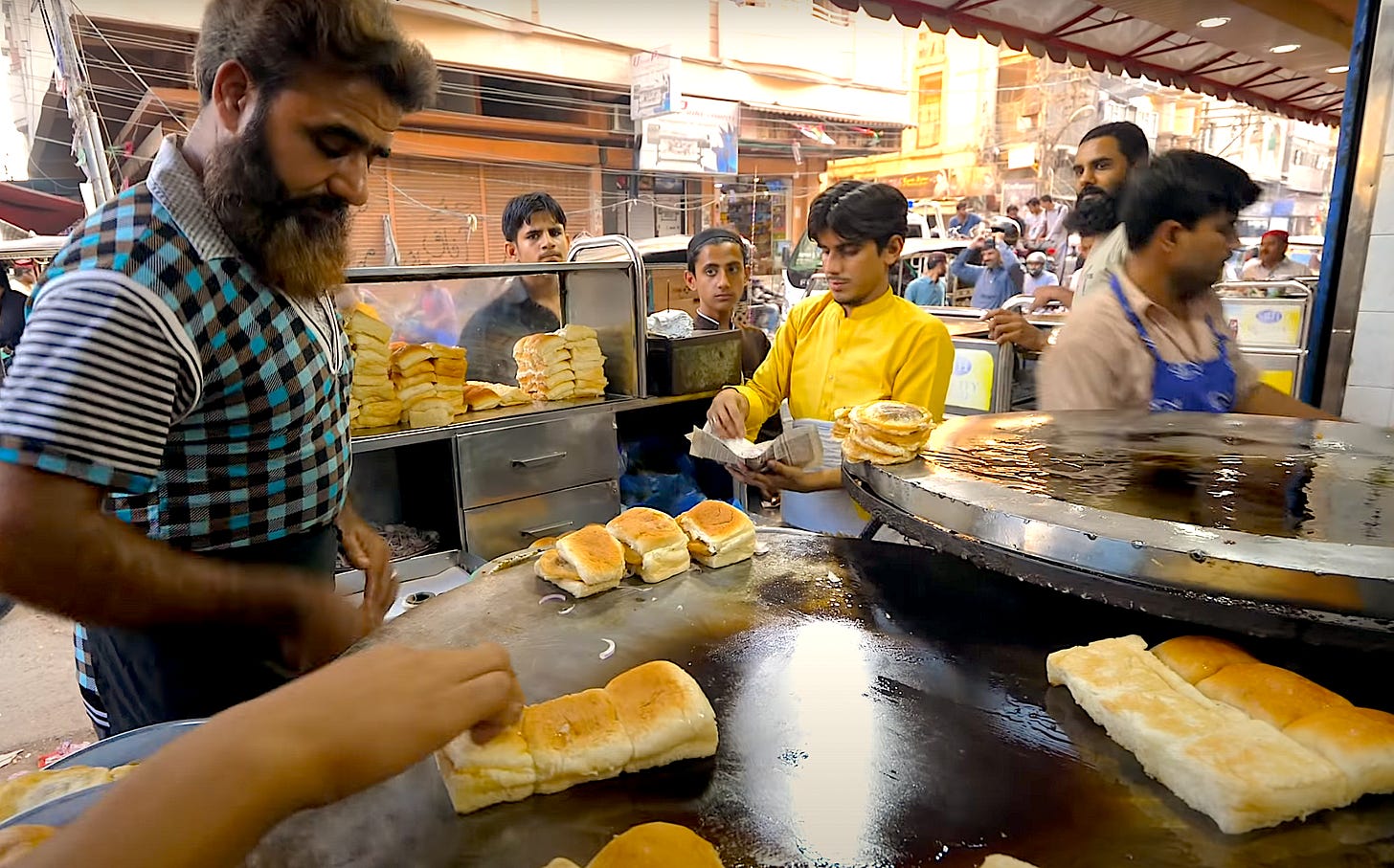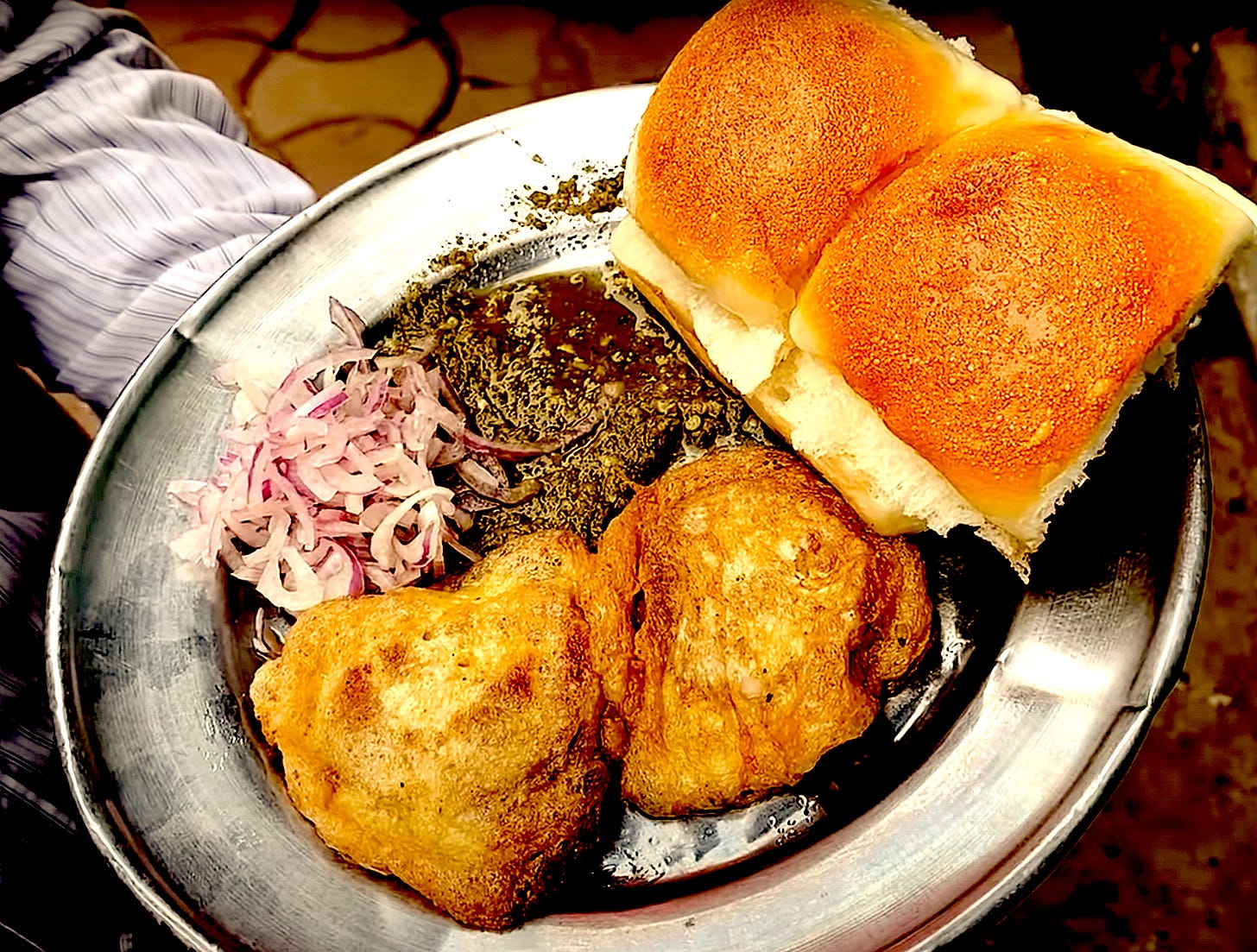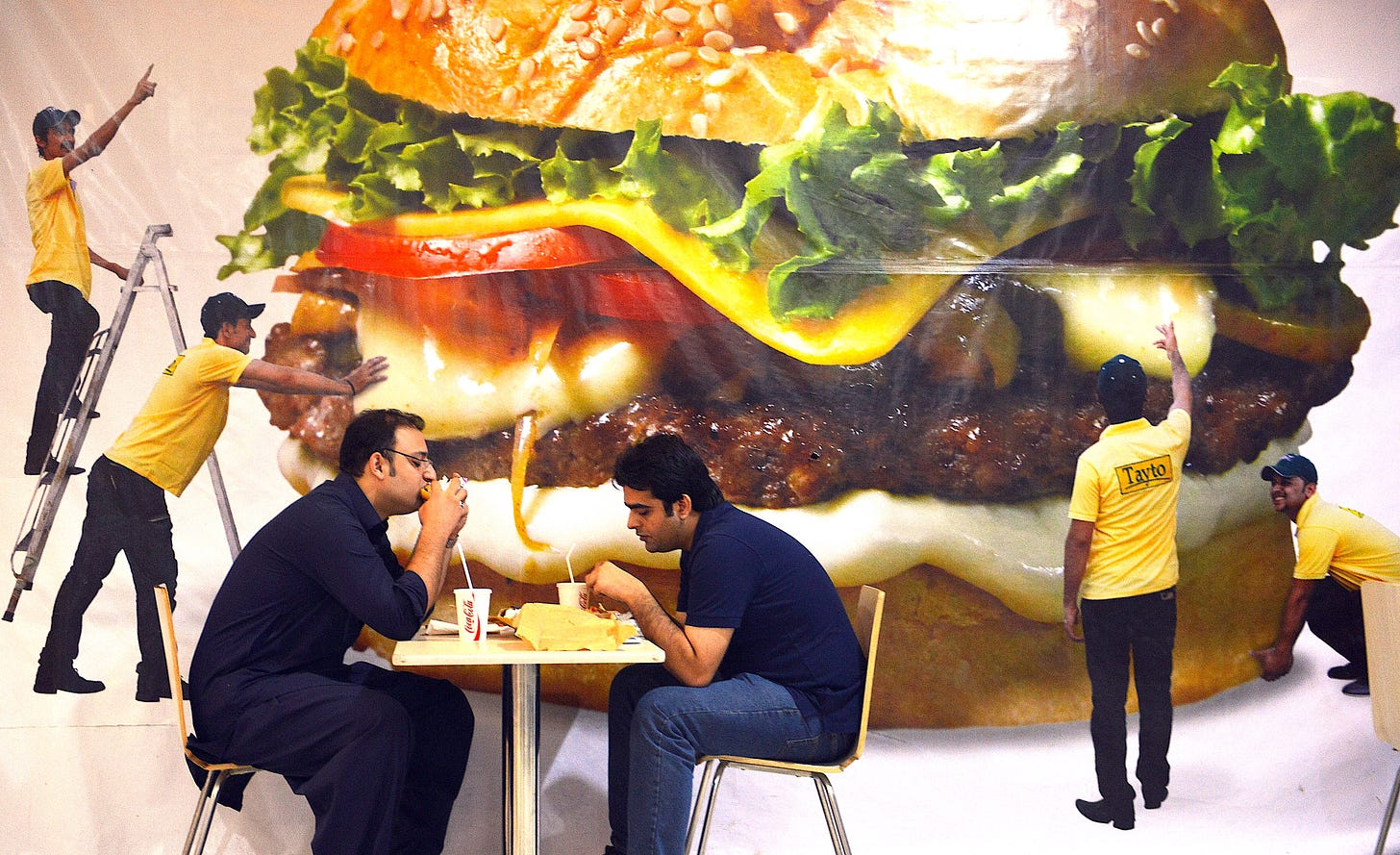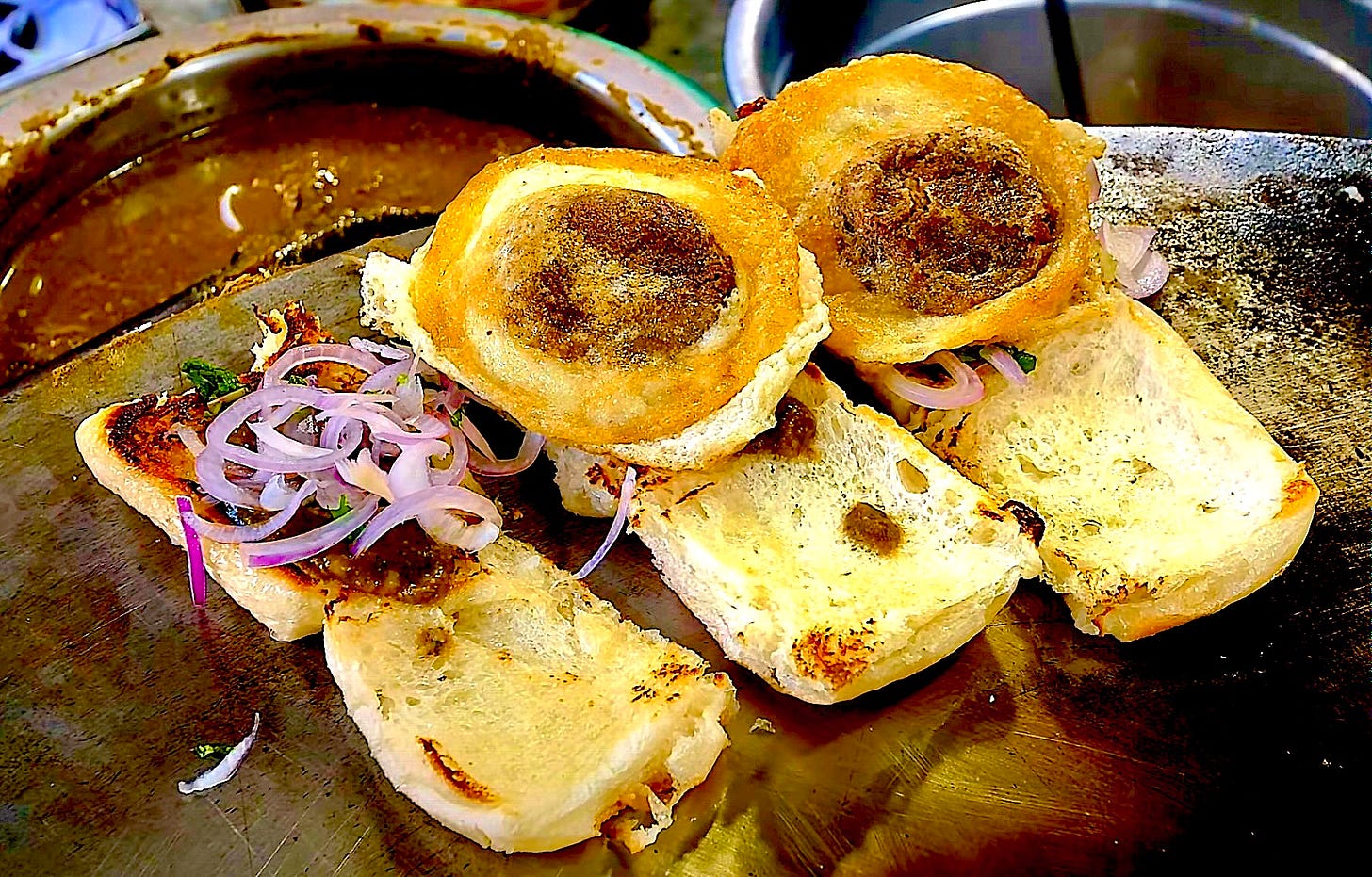Notable Sandwiches #23: Bun Kebab
Known as the "poor man's burger," Pakistan's quintessential street treat has become a (delicious) class signifier
Welcome to the latest installment of Notable Sandwiches, the feature where I, alongside my editor David Swanson, nibble week by week through the bonkers document that is the Wikipedia List of Notable Sandwiches. This week: bun kebab, a Pakistani street food classic.
For Maham Hasan, 28, childhood travels through the narrow, overcrowded streets of the historic Chur Chowk neighborhood of Rawalpindi, Pakistan, meant one thing. It meant that she and her young cousins had managed to scrounge bus fare, and in front of the thronged shops of the Aqsa Plaza Mall, had at last found a sought-after treat. Hot from a vendor’s cart—a meat-and-lentil patty (or shami kebab) dressed in chutney, draped in red onion, enveloped in a wash of fried egg white, all nestled in a butter-slicked roll—was the bun kebab. A quintessential Pakistani street food, the bun kebab is slung quickly and in quantity from Karachi food carts and Islamabad street side stalls to hungry kids, workers, students and anyone seeking a cheap and flavorful bite. In New York, I called several Pakistani restaurants in search of a stateside sample, to no avail; according to Hasan, I might as well have called a series of diners and bistros and asked for their signature dirty-water hot dog. The bun kebab, in other words, fills precisely one niche: it’s designed to be bought on the go, and bitten into with gusto—cheap, hot, and portable.
“I’ve only ever seen it from street vendors,” says Hasan, now an associate producer at Vanity Fair. “My cousins and I would buy anday wala burger [the Urdu name for bun kebab, meaning ‘burger with an egg’] when we truly had no money to buy anything else to eat. It’s pretty cheap, but oh god, it’s so good.”

In beef-loving Pakistan, the bun kebab—with its frugal addition of lentils to the patty to stretch the meat—is sometimes known as the “poor man’s burger.” Vegetarian versions are relatively common, but the standard mixture is lentil and beef, with supplemental protein and binding provided by a swaddling of egg. In a country with a per-capita income of less than $5-a-day and where 40% of the urban population lives in slums, it’s no wonder the bun kebab crops up in every nook and cranny of lower-income neighborhoods. As Hasan puts it, each lower-middle-class bazaar has its bun kebab guys—but they tend to vanish in more affluent environs.
That’s because, in the downtown of Rawalpindi and the tonier districts of Lahore, the “poor man’s burger” has given way to the real thing. In Pakistan, as elsewhere around the globe, a burger—from McDonald’s, or Burger King, which arrived in the country in 1998 and 2013 respectively—isn’t the symbol of cheap convenience that marks it in America. A McDonald’s is a beacon of upper-middle-class respectability, known for its cleanliness, corporate Western ideals, and products designed to adhere rigidly to a set of standards. A McDonald’s burger isn’t diluted with lentils or stretched with egg or bread crumbs; it’s beef all the way through, and served in air-conditioned tranquility. Hasan recalled that real US-style burgers were a treat for birthdays or Eid al-Fitr; during medical school, her mother would go to a restaurant that served burgers once a month and split one with a friend, “because she could not afford a whole one.” On the other hand, though the bun kebab mimics the form of the burger, it is a democratic enough food to be had with coins cadged together from an indulgent grandmother or a bemused uncle, eaten with more enthusiasm than ceremony on a street corner.
For Nur Ibrahim, a reporter at Snopes who grew up in Lahore, the burger and the bun kebab were twinned by their role in her life—an outgrowth of what they represent in Pakistani society at large.
“My friend and I nicknamed each other burger and bun kebab,” she explained to me. “I was a burger—English speaking, fancy—and my friend was a bun kebab, salt of the earth, Punjabi-speaking, less fancy.” In her Anglicized family, attending English medium schools in a relatively elite city, she understood being called a “burger”—and she wasn’t alone.
The “burger kids” or “burger generation”—a term describing young, upper-class Pakistanis who are influenced by and mimic Western fashion, language and mannerisms—has been around since the launch of the first burger chain in Pakistan in 1980, a McDonalds-inspired spot called Mr Burger. According to the comedian Umer Shareef, who observed that teenagers from Karachi’s most affluent neighborhoods flocked to the burgeoning business, “burgers” are “the kind of people to pick up a roti using a tissue paper”—pretentious, snobbish, fanatically aping Western mores. According to Al Jazeera’s sweeping overview of the “burger generation,” the term long connoted being spoiled, cocooned from the world.
But since the mid-1990s, the “burger generation” has come into its own. In 1996, former cricket superstar (and erstwhile British tabloid fixture) Imran Khan founded the Pakistan Tehreef-e-Inshaf Party (PTI), an Islamic-socialist party that aimed to end religious discrimination in Pakistan and create greater egalitarianism in the country. Its constituents were mocked as “burger kids”—and began to reclaim the pejorative, wearing T-Shirts that read “Burger Army.” By the 2013 elections, the burger generation was poised to make a difference in the political fate of the country.
“It’s the first time that the burger group will also come out to vote,” Awami Muslim League Sheikh Rasheed Ahmed told Al Jazeera before the 2013 elections. “They’re going to join the chapati-and-curry folk. They might need to carry their laptops on their heads to protect them from the sun.”
Five years later, PTI had a presidency under its belt, helped along by the “burger” constituency—and, in a country where 61% of the population is under 25, the majority has never known a Pakistan without burgers. It’s not often that a pejorative stays static; just ask the Deplorables—it can morph into a powerful tool for in-group cohesion. That’s how the burger generation becomes a burger army, even if you can still get a bun kebab for far cheaper. (At the moment, with Khan embroiled in scandal, the burger army appears to be in retreat).
Situated at the seam of the upper and lower classes, the tale of the burger and the bun kebab has a prince-and-the-pauper feel to it. But just as princedom isn’t solely about the royal treasury, burgerhood is partially about Anglicization, a certain postcolonial inclination to go abroad or align with the West.
“Some could argue I’m a burger person now, but literally no one could call me that,” said Hasan. “Burger families were rich—upper class, had access to all this food, spoke only English back home with American or British accents, and wore only super modern Western clothes. For me, it’s fuck English back home. I wear my traditional clothes. I eat like a local. I speak Punjabi. I don’t think I’m better or superior because I know English.”
The declaration lies atop our conversation like a plume of red onion on a bun. You could ask for those to be removed to avoid “onion mouth,” Hasan told me, but she never did. Red onion washed slightly in vinegar and salt; a bun lightly soaked with oil and butter, and a steaming patty within. Hungry New Yorkers can find them in abundance in Jackson Heights and Coney Avenue this weekend, for Eid al-Fitr, the Muslim feast celebrating the end of Ramadan.
“Burgers aren’t inherent to us,” Hasan said. “When I think of a bun kebab, my mouth waters, and I miss home.”
Author’s Note:
I love the independence and freedom to choose my own topics this platform offers me. However, in order to keep the Sword and the Sandwich sustainable beyond the next few months, I need more paid subscribers. If you’ve enjoyed the content thus far, whether about sandwiches, shitheads, or both, please consider a paid subscription. I’ve lowered prices for the next three months to $5/month (or $50/year), and would appreciate your support greatly.









I HAVE enjoyed the content, so here’s my money. May many others follow my example.
Also subscribed as I've been enjoying both the food content and the other content.